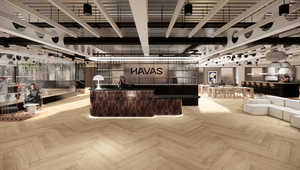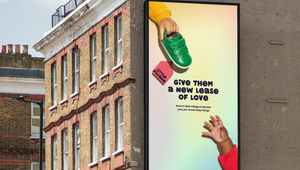
Chris Hirst on the Long and Short of Coronavirus

“You hope that this encourages people to realise our innate fragility and the illusoriness of everything we take for granted and that will lead to lasting behavioural changes,” says Chris Hirst, Global CEO of Havas Creative. “And it absolutely will lead to lasting behavioural changes. The question is which ones?”
Leading a multinational agency in the era of Covid-19 gives rise to many questions. Clients are facing a diversity of challenges and, internally, sudden changes are forcing through new ways of working. And there are far bigger questions too, about the long term social, psychological, cultural impacts.
Some of those questions, at least the short term questions, have answers. Havas have been leaning heavily on expertise in their China offices. Scoping out a rhythm for the coming weeks and months for markets still in peak of coronavirus or waiting for it to hit, there’s hope but caution.
“They’re definitely not back to normal in China. And they’re wary that as soon as they raise the restrictions it will come back. None of us a epidemiologists, but I presume what governments are doing is having a series of managed humps and hope that each next hump is slightly lower than the one before as they test more and get better at managing it. That’s the best case,” says Chris.
From the local team’s insight documents, the rest of the network has learned much about media consumption patterns and activity by sector. They’ve seen media prices drop while screen time – both traditional TV and online – has shot up. The home of Alibaba is already a highly engaged e-commerce market but demand on those platforms has increased. Cloud-based online businesses are flying but some sectors like automotive have seen activity plummet to almost zero – and the remaining question is how quickly activity will return in sectors that typically see a slow purchase cycle.
“People are still talking about delaying not cancelling. And I think that’s true of some things – people are still going to want to buy a new car,” says Chris. But some things are less certain. Experiential and events business have some tricky months ahead as lockdowns and physical distancing become embedded. As a keen scholar of history (though an engineer by training) Chris can also draw insight from the patterns of the past. “I think that people’s behaviour will change in ways that are hard to predict right now. People might become more altruistic and part of the world – ‘oh my god there are dolphins in Venice’ – that’s not typically what happens after events like this, we might also find ourselves in a more fragmented, nationalistic world. I think people’s behaviour will change. Some stuff will come back, events will come back, people are social animals. Festivals and live music will come back but the question is when.”
And for clients that are seeing a demand, the questions are entirely different. How to help without exploiting, how to solve and serve need. Reckitt Benckiser, for example, which holds brands like Dettol and Durex is a major Havas client. The question too, for brands that want to be active in their marketing is how to create content and communication.
“Clearly TV and media prices are going to come down because brands will want to spend less, but at the same time there are brands that are going to want to market themselves,” says Chris. “A lot of work will be recut and repurposed.”
It’s not just client challenges that need to be addressed, the whole network is also getting used to working remotely. It’s a situation which everyone has been quick to adapt to and is providing the leadership with optimistic puzzles about what the future of agency life will look like. Remote working at scale has long been talked about by the industry, and we’re now seeing just how easily feasible it is. On the flip side, as the reality of isolation hits, it also reveals the importance of in-person contact.
“I do think, because we’ve done this vast social experiment, it will change work,” says Chris. “Not everyone can work from home and it’s actually going to starkly illustrate the limitations of what you can and can’t do from home. We’ve got a building in King’s Cross [London] and we’ve got 1800 people in that building and it makes you think, ‘do I need 1800 desks?’ I definitely don’t think I need everybody in the building all the time. But I definitely don’t want a situation where everybody is isolated at home never seeing anyone! Where is on the spectrum will we end up? And I think that’s a good thing. That’s less commuting, that’s better quality of life, that allows people to be more flexible. It gets our costs down as a business, our overhead down. All good things. I think there will be lasting changes in that regard.”
There are other long term changes too, on a smaller, textural level that will be woven into our interactions, our relationships. Chris ponders that we might ourselves go down in history as the ‘hand wash’ generation or the ‘no handshake’ generation, boring our bored grandchildren with tales of when we were shut inside for months.
And right now? “Of course,” says Chris, “the irony is I think that never have I wanted to go and sit in a café in Rome than I’ve wanted to sit in a café in Rome now, just because I can’t.”















